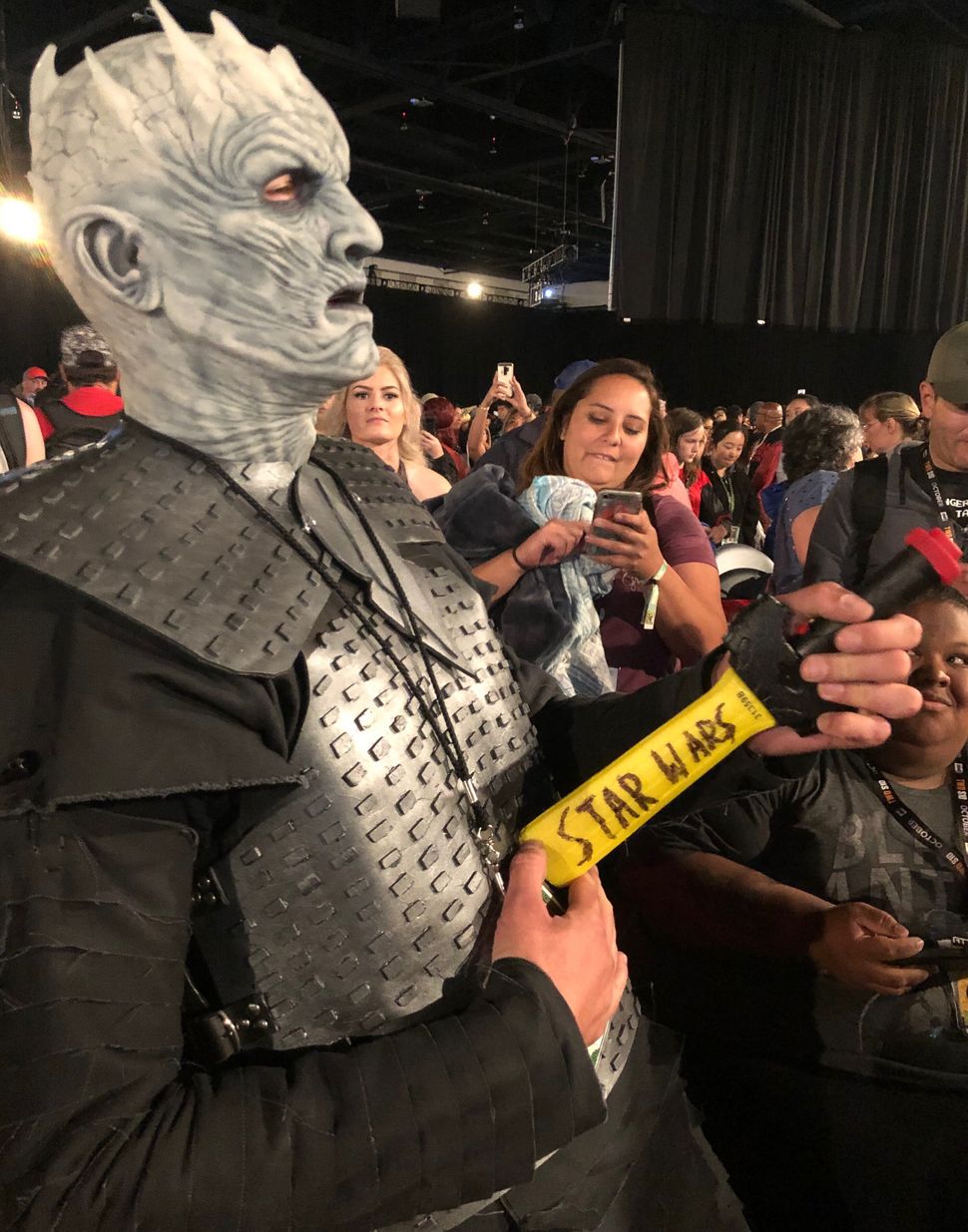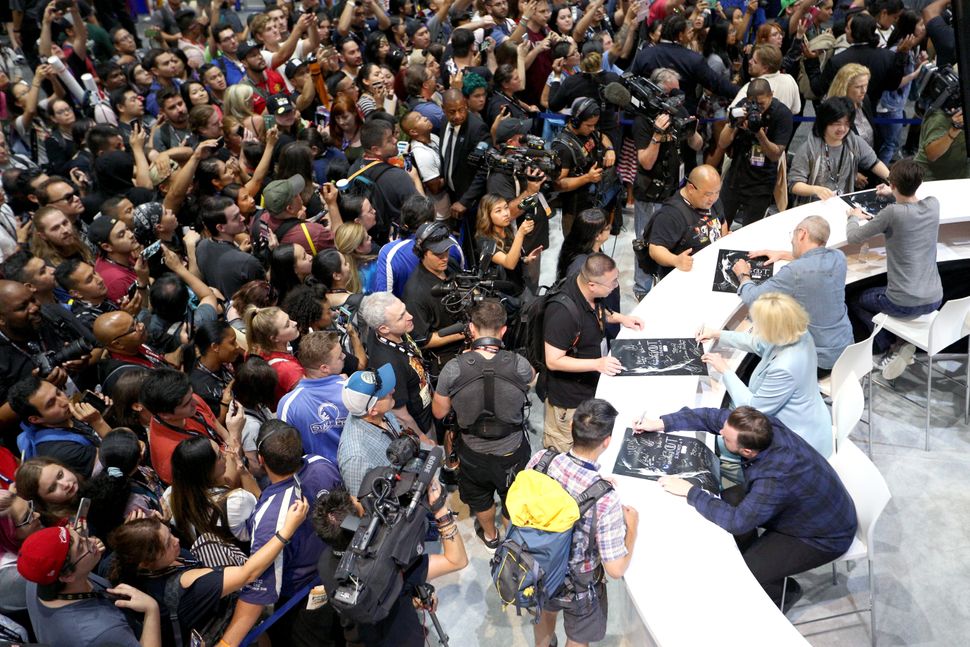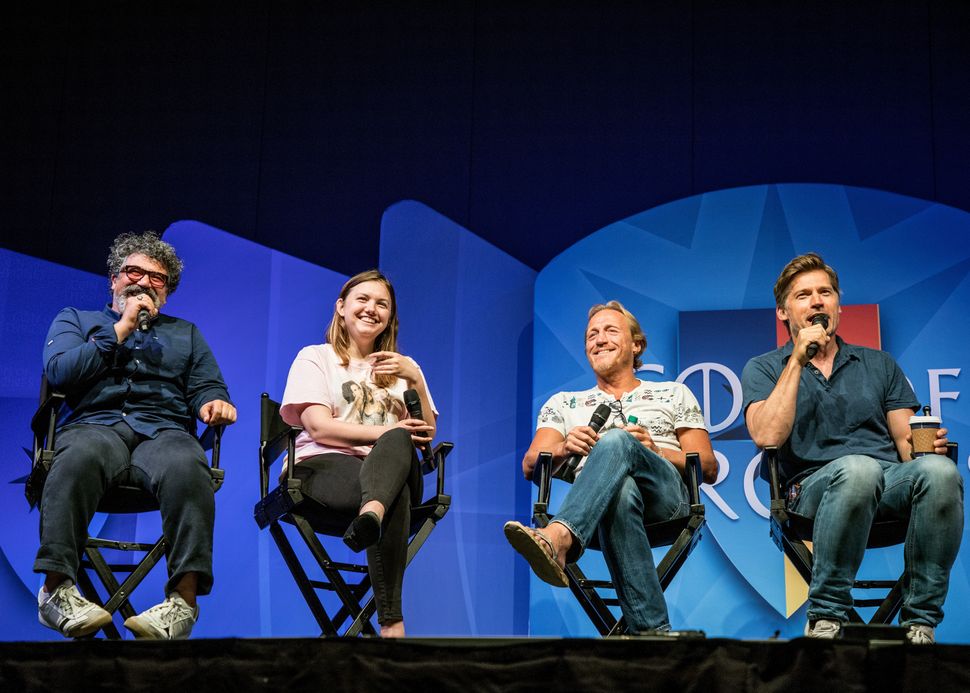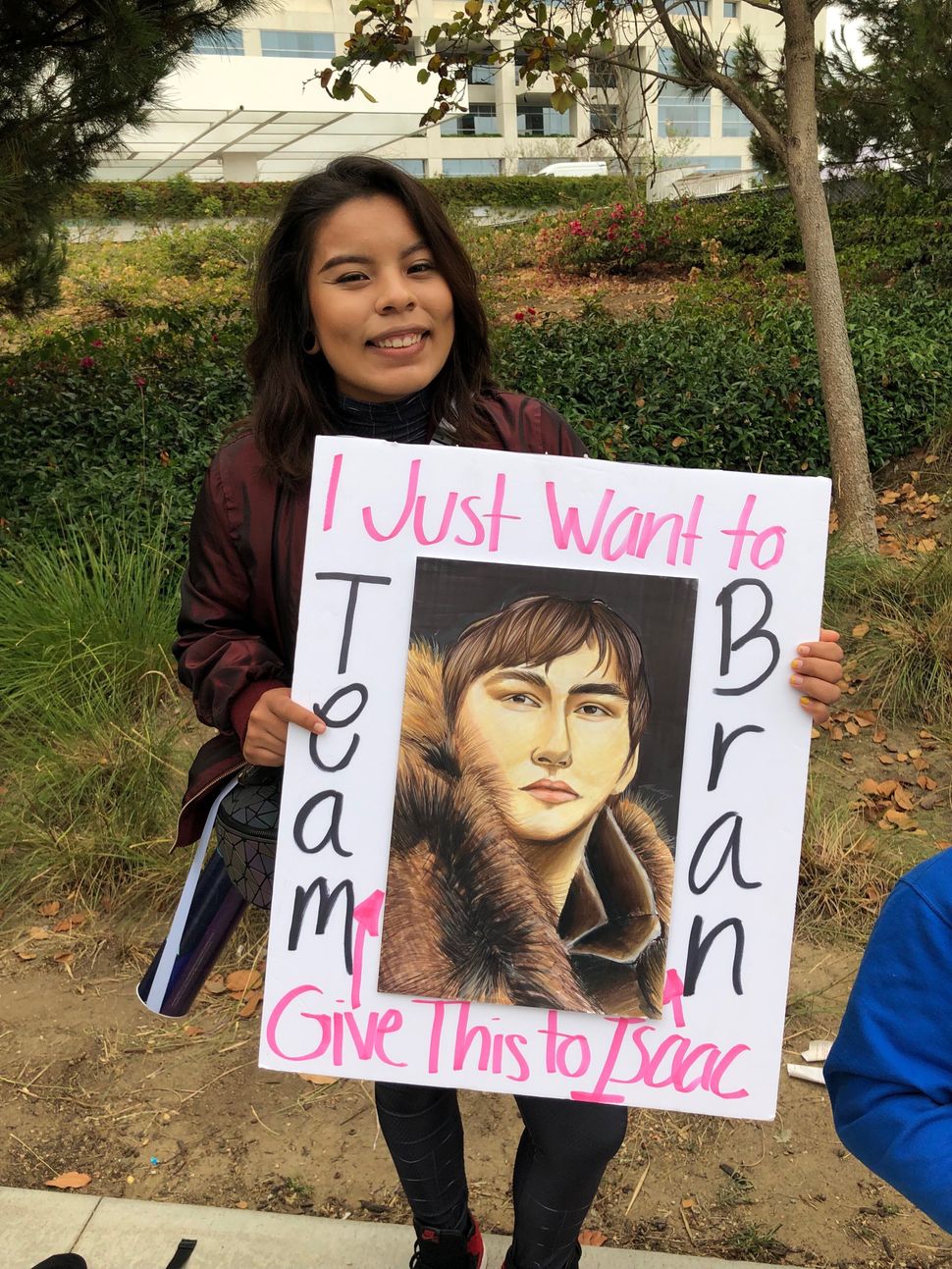WEST OF WESTEROS — Hannah Floeter slept outside the San Diego Convention Center because, though it was July, winter was coming. The University of Illinois at Urbana-Champaign student and San Diego native had been coming to Comic-Con for years, but others in her party were usually the ones to camp out. This year, it was her turn.
She woke up at 5:30 a.m. and knew she’d have a 12-hour day of waiting in line and sitting in Hall H. But it’d all be worth it. She’d be there for the “Game of Thrones” panel on the series’ final season.
The waiting paid off. She was fourth in line for the panel’s Q&A portion. Typically, the first five to seven people get to pose a question. She was right in the mix to ask the cast of the HBO show who’d they pick for the Iron Throne if it weren’t Bran — her way of asking about the show’s writing without actually asking about the writing.
Comic-Con personnel were screening questions, as always, but soon enough Floeter noticed something was off.
“They were like, ‘We want this to be positive,’ which I’ve never heard them say,” Floeter told HuffPost.
She had been to plenty of panels before, and questions weren’t necessarily all warm and fuzzy. Now, Floeter said some people in line had to change what they wanted to ask. Anything about the writing seemed to be out. And even stranger, costumes were getting censored, too. A Daenerys Targaryen cosplayer had to set aside a Starbucks cup. A Night King cosplayer had to remove a prop dagger sticking out of his gut that had “Star Wars” written on it.
Floeter had never seen this before. This was Comic-Con. Attendees were supposed to be able to dress how they wanted.
“There were no bad words written, nothing offensive — well, offensive in my mind. But apparently, it would’ve been offensive to the actors or HBO,” Floeter said. Comic-Con did not respond to HuffPost’s request for comment.

The panel was off to a weird start, to say the least — though it wasn’t entirely unexpected.
“Game of Thrones” is perhaps the most culturally defining television phenomenon of the last decade. In an age where streaming continually fractures audiences, the series seemingly rode the rising tide of social media to become the last vestige of communal watching and appointment TV as we know it. It changed the landscape, as seen in everything from continually ballooning TV budgets to the glut of fantasy stories now being tirelessly mined in search of the next “Game of Thrones.”
But Season 8, which ended the show’s near-decade on air in May, wasn’t like the others.
Yes, the season received a historic amount of accolades: 32 Emmy nominations in 2019, which led to 12 wins including the coveted Best Drama. It also brought in a record-breaking amount of viewers and featured the most-tweeted-about episode of scripted television ever. However, the main storyline that emerges when looking back was the backlash. The hate wasn’t universal, but it was palpable.
Throughout Season 8, the citizens of Twitter cycled through a laundry list of complaints: the episodes were too dark, the White Walkers were gone too quickly, Arya killed the Night King just to “avoid the expected,” Daenerys “kind of forgot” about Euron’s fleet. Cersei didn’t get to do anything. The coffee cup left in the background was proof the series was rushed; the water bottles were too. From Jaime going back to Cersei to Daenerys scorching King’s Landing on a whim, character arcs were thrown out the window faster than Bran in the pilot episode.
Up until the “Game of Thrones” Comic-Con panel, that pushback had basically lived online through tweets, viral petitions, uncharacteristically low ratings on review sites, think pieces and articles about everything the season got wrong. But on a July day at Comic-Con, there were around 6,500 fans in one room all eagerly awaiting answers. And everyone seemed a bit on edge.
Ahead of the panel, Eddie Ibrahim, director of Comic-Con programming, made an impassioned speech to the audience. Quick translation: “Please don’t be mean.” There were groans. There was applause. When the actors arrived, they were met with roars from the crowd; Nikolaj Coster-Waldau (Jaime Lannister), Liam Cunningham (Davos Seaworth), Jacob Anderson (Grey Worm), John Bradley (Samwell Tarly), Conleth Hill (Varys), Maisie Williams (Arya Stark) and Isaac Hempstead-Wright (Bran Stark) were all there. They lifted coffee cups from the table, poking fun at the viral moment from the final season. But some of the smiles and laughs from the cast seemed trepidatious, like they were half-expecting the crowd to all of a sudden turn and start calling for Ned Stark’s head.
In the end, Ibrahim’s lecture, the costume policing, any nerves — it was all much ado about nothing.

Any backlash was mostly pushed aside. The moderator’s line of questioning went on so long that the fan Q&A was cut altogether. Hill chalked up Season 8 criticism to a “media-led hate campaign,” and no one said otherwise.
What was everyone really expecting though? The subjects of all the fan ire weren’t even there.
When it was originally announced in June that showrunners David Benioff and Dan Weiss were set to appear at the panel, fans had debated a question online: should they boo or simply laugh? The showrunners’ inclusion seemed to prompt an organized effort to disrupt the event. Perhaps in the least-shocking twist of Season 8, the pair dropped out days before the event, along with some of the actors who were originally announced to attend. Their reason: “production and scheduling conflicts.”
The fans didn’t buy it.
“They just don’t want to acknowledge the backlash,” said Asya Cook, a resident director at UCLA, who waited in line for hours to experience the “Game of Thrones” panel. “I would have appreciated if they would have come and just talked about that and have a conversation with the fans. How it’s received now is that they’re scared or they’re running away. I’m not a fan of that.”
Through it all, fans kept pointing their fingers at the showrunners, but perhaps there were other factors to blame.
In George R.R. Martin’s “A Song of Ice and Fire” book series, which started this “Game of Thrones” phenomenon, there’s a prophecy that says “the dragon has three heads.” When analyzing the response of the fandom to Season 8, it seems the backlash had three driving forces as well: the growing hype that set impossible goals; the strategy of subverting expectations that would never satisfy fans; and the reality that after the show’s storyline passed the books’, it just wasn’t Martin’s story anymore.
The Growing Hype
By the time “Game of Thrones” reached its final season, there was a blood drive asking fans to “bleed for the throne,” a global scavenger hunt, Super Bowl crossover ads where “Game of Thrones” murdered a Bud Light Knight and an elaborate Oreo-themed homage to the title sequence because what’s a show about “tits and dragons” without milk’s favorite cookie?
But nothing happened overnight. TV was much simpler when the show premiered in 2011.

Cord-cutters had yet to inherit the Earth, as Netflix wouldn’t unleash binge-watching on the world with the help of “House of Cards” until two years later. Prestige dramas were about advertising agencies and Claire Danes hunting terrorists. Popular network shows often had variations of “CSI” in the title and reality TV was still ruling the airwaves, with multiple “Keeping Up with the Kardashians” spinoffs premiering in the same year.
High fantasy shows were basically nonexistent in primetime TV, but the recipe for success was there. “Lord of the Rings” and “Harry Potter” were examples of book series finding huge followings and big box office numbers.
For “GoT,” its built-in book fanbase made it one of the most anticipated shows of 2011. It’d take years of buildup and steady growth to become what it did, but with the help of the exploding social media landscape, speculation and a loyal following, there was no ceiling in sight.
Nielsen numbers show the series continued to grow by millions of viewers season over season, from 3.3 million average viewership in Season 1 to more than 13.7 million in Season 7. Piracy data monitoring company MUSO reported that by Sept. 3, 2017, Season 7, which had just ended in August of that year, had reached 1 billion illegal downloads and streams.
And circumstances were about to raise “Game of Thrones” to even higher levels. The eighth season wouldn’t air in 2018. Instead, fans had to wait until 2019 for the final six episodes. It was the first year since 2011 that “GoT” would not air new episodes. The layover felt longer than the Long Night in Old Nan’s stories, a time when the sun hides for years and children are born, live and die all in darkness. There were 595 days between seasons.
The growing hype, coupled with the “gestapo”-like levels of security surrounding Season 8, led fans to only hear what HBO wanted them to: The season would have the “biggest battle ever,” there were “55 night shoots,” actors cried, there were fake scenes and multiple endings. Peter Dinklage, who played Tyrion Lannister, said the final season battle would make “the Battle of the Bastards look like a theme park.” Emilia Clarke, or Daenerys, now infamously said in one interview, it’d be the “best season ever.”
Even now, it all sounds pretty awesome. (Fans would later claim seemingly glowing interviews were sarcastic and clearly proof the cast was trying to warn everyone something was wrong, like hostages desperately trying to get a secret message out.)
Perhaps there were early signs that expectations should’ve been course corrected. Season 7 was widely criticized for characters time-jumping from one place to the next, and the Season 8 episodes, which were rumored to be six feature-length films, were revealed to be around an hour and 20 minutes max.
But the hype was unbowed, unbent, unbroken.
The Season 8 trailer set an HBO record; it was viewed 81 million times across platforms in the first 24 hours after its release. Promo teasers, such as “Aftermath” and “Crypts of Winterfell,” seemingly focused on the battle with the White Walkers, both teasing that main characters would not make it through. Anticipation was reaching critical mass.
“Honestly, I was dreading it,” said Vanity Fair reporter and “Storm of Spoilers” podcast host Joanna Robinson, reflecting on the final season. “I was like, no way this is going to end well. Honestly, that’s how I felt. No way, only because the pressure was so intense. And everyone’s expectations were so high. And it was too big. I was just like, I don’t know how they land this plane in a way that satisfies people.”
Whatever number of people “Game of Thrones” was reaching before, it’s safe to say the final season’s viewership walked behind it ringing the shame bell.
According to Nielsen, the final season averaged 15.4 million viewers per episode. MUSO reports the premiere alone was pirated more than 54 million times in just the first 24 hours. While Season 7 averaged more than 621,000 Twitter interactions per episode, according to Nielsen, Season 8 averaged more than 1.5 million. As of a day after the finale, there were 100 million tweets about the show in 2019 alone, according to a Twitter spokesperson.
By Season 8, the “Game of Thrones” speculation train was leaving the station, and media outlets couldn’t jump aboard fast enough, covering anything and everything the fandom could create. Even The New York Times was writing about memes from the show.
This hype and the write-up-anything-and-everything mentality of media sites also appears to have helped the petition to redo the final season go viral.
Dylan D., the author of the infamous petition, didn’t make it with the intention that it would blow up. But after a relatively modest amount of signatures and a Change.org press release, news outlets picked it up, causing it to gain more and more traction. Soon, it had 200,000 signatures, then 800,000. Today, the petition sits at 1.7 million. It has been lauded by Season 8 detractors, criticized by the cast and even officially dismissed by HBO.
Superfans Elio García and Linda Antonsson run fansite Westeros.org, and their vast knowledge of the “Song of Ice and Fire” world led to them writing Westeros history book ”The World of Ice and Fire” with Martin himself. They explained the rise in theories, rumors and interest during this downtime somewhat mirrored the rise in Martin’s fandom during the early waits for his books to be published.
While ”A Game of Thrones” (1996), “A Clash of Kings” (1998) and ”A Storm of Swords” (2000) all came out within a few years of each other, ”A Feast for Crows” wasn’t released until 2005. “A Dance with Dragons” followed that six years later in 2011. The last two books in the series, ”The Winds of Winter” and ”A Dream of Spring,” still don’t have release dates.
“A year between each book, I’m not sure they would have been as popular. It would have been too fast. The momentum wouldn’t have built enough,” Antonsson said. “But certainly there is a point where the wait means that people go off the reservation, coming up with stranger and stranger theories.”
Wild theories have been around since the beginning, but García explained it has only gotten worse, especially with the final season: Could Bran be the Night King? Most definitely. Is Tyrion a time traveling fetus? No doubt about it. Varys is a Little Mermaid? It’s part of your world.
“People were trying to figure out how they could wrap it up so quickly. And they were sure that it would be something really amazing,” García said. “Then they wrapped up quickly by wrapping it up quickly.”
Subverting Expectations
Early on while writing his “Song of Ice and Fire” series, Martin decided he wouldn’t change the ending based on fan guesses, because he had already laid out the clues. He told Sky News in 2014 that changing the story to surprise fans would result in “disaster.”
Welcome to the Season 8 discourse …
When the “Game of Thrones” showrunners explained in “Inside the Episode” videos that Daenerys “kind of forgot” about the Iron Fleet and Arya killed the Night King to “avoid the expected,” it didn’t sit right with people. Fans defending the season continually brought up how the show always “subverts expectations,” and the phrase basically became the mocking House Words of Season 8, inscribed on its tombstone, or at least on its memes.
“Arya and the Night King bothers people not because it’s Arya, I think that that’s awesome … but it felt off because Benioff and Weiss had been specifically leading everyone to believe that Jon was going to be involved somehow,” Kim Renfro, a reporter at Insider and author of the upcoming “The Unofficial Guide to Game of Thrones,” told HuffPost. “They thought that it would be a good surprise for it to be Arya. Surprising people in that kind of a manipulated way isn’t going to work all the time.”
In order to have Arya fit into the storyline, the showrunners took an old line that Melisandre (Carice van Houten) said to the young assassin that she’d shut “brown eyes, blue eyes, green eyes” and retconned it by having the Red Woman say it again with blue eyes last, making it sound like she had been hinting at Arya killing the blue-eyed Night King the whole time.
“People want to feel like they have a handle on the story because of the depth, the details or the subplot that you’re putting in there,” Renfro said. “And to not put them in there for the sake of subverting expectations, I think is what kind of cracked the seal of everyone feeling like they were sort of in the weeds now.”
As an example of the power of the fandom, Benioff and Weiss have recalled multiple times that during their first meeting with Martin, he asked them who Jon Snow’s mother was. The pair said their “shocking” and correct answer — seemingly that Snow’s mom was Ned Stark’s sister Lyanna — was the reason Martin let them adapt the series.
If you had only read Martin’s novels, Lyanna being Jon’s mother was truly a surprising answer. But by the time the pair met with Martin in 2005, fans had been discussing the idea for around a decade. Antonsson recalls seeing the initial discussions of the theory that Lyanna was Jon’s mother, dubbed R+L=J (Rhaegar + Lyanna = Jon), in 1997 on the Dragonstone board, the first major “A Song of Ice and Fire” community.
“The books came out at the time when the internet was finally really showing up and communities are forming,” García told us. “Suddenly, you have this hive mind. It’s not just isolated readers, it’s hundreds and then thousands and now hundreds of thousands all pouring over these books. No writer can really hide everything from these fans there. You’re not smarter than the hive mind of hundreds of thousands.”
Passing the Books
Moving beyond Martin’s books was never the plan for the showrunners; however, as time went on and the novels remained without release dates, it became evident it was inevitable. Now, Benioff and Weiss were forced to create the series essentially based on Martin’s CliffsNotes. He had filled them in on the “broad strokes” of where the series was going in 2013.
It was a turning point in the fandom.
At Comic-Con, Nami, a cosplayer from New Jersey who’s in a master’s program for biology, summed the season up to “bad fanfic.” She was glad there weren’t more seasons, as HBO had said they wanted.
“You can’t write like the author and they were not suited to write an entire series. And I think they were offered like two extra seasons for this. And they didn’t take it. And honestly, I’m glad they didn’t. Because as much as I think they could have told a better story, I also don’t know that they were capable of it,” she said.
During Season 8, members of Free Folk, a “Game of Thrones” subreddit, manipulated the Google Search results for “bad writers” to show pictures of Benioff and Weiss; the aforementioned petition was all about getting a new season with “competent writers.”
No one was expecting this severe of a reaction to the final season, but some backlash was always going to happen.
“I feel like in a way, Benioff and Weiss didn’t stand a chance, especially the second that they overtook Martin’s books,” said Renfro. “I feel that was kind of like the ultimate doom for them just in terms of how fans were going to respond, because it felt like nothing that they would do would wholly satisfy folks, just because everyone felt like it wasn’t Martin’s story.”
Up until Season 5, ostensibly, spoilers weren’t actual spoilers. If you wanted to know what was happening in the story, all you had to do was crack open one of Martin’s books. With the show passing the books in Seasons 5 and 6, book readers and show watchers were all in the same boat, just rowing along like a Season 3 Gendry (Joe Dempsie).
Events that hadn’t happened in the book — Sansa’s (Sophie Turner) rape at the hands of Ramsay Bolton (Iwan Rheon), the deluge of tragedies that befell Stannis’ (Stephen Dillane) quest for the throne, the time jumps and ill-advised plan to go beyond the Wall to catch a wight — brought on more and more criticism. In Season 5, García stopped watching the show altogether.
Without Martin’s source material as a guide and only six episodes to finish up, the final season felt more like a highlight reel of what happened in Westeros rather than actually seeing the story unfold logically.
For as much blowback as it got, Season 8 really did try to please fans. It relied heavily — perhaps too heavily — on callbacks to early seasons, chasing its old magic without truly catching it. Early years of the show excelled at portraying small, quiet moments, some of which weren’t in the books, such as the Season 2 conversations between Arya and Tywin (Charles Dance). But the final season was about being as big and brash as possible. There’s little room for things like Arya and Sansa reacting to Jon’s (Kit Harington) parentage and Mr. Snow petting his dog in what could’ve been their last meeting ever when you have extended sequences for Jon and Dany’s comical dragon riding date and Cleganebowl.
“That’s a fandom thing,” Robinson said of Cleganebowl. “You know, [the showrunners] said in the past, that you don’t listen to fans, but that’s you paying attention to what the fandom wants. And what’s also true is fans shouldn’t write TV.”
She added, “I do think the pressure, it was too big. Everyone’s expectations are really high. And then I think that ended up sort of seeping into the groundwater and affecting how the final season was constructed too.”
What’s West of Westeros?
Around two months after the series finale — and a week before fans would be ignored at Comic-Con — HuffPost walked among the smoldering ashes of Season 8 and found life at “Game of Thrones” fan convention Con of Thrones in Nashville, Tennessee.
While Comic-Con handles hundreds of thousands of fans each year with almost mechanical efficiency, Con of Thrones is more in the 4,000 per day range. It’s a more intimate setting, and many of the panels are fan-created. Here, the question-and-answer segments at each panel were never cut. In fact, they were the main event.

“I think there was a real shock of the anger,” Coster-Waldau said during a fan Q&A panel, explaining the actors had been expecting people to love it. “That was not what was given, so they were more like, ‘Huh? What? They don’t like us anymore.’”
The crowd let out surprised, reassuring objections: “Nooooo!”
“I think that there was a genuine surprise that people didn’t think it was the greatest hour of television ever made,” he said somewhat jokingly about Episode 3 of Season 8. “And I think it was a good slice of humble pie if you ask me.”
The warm reception he was greeted with was enough to make you wonder if the pushback to Season 8 ever actually happened at all. In one panel, a fan said the show saved his life. In another, a fan expressed how the show has taught people so much about themselves.
“I just wish Dan and David could be here to hear this, to understand that people really love the show, that suddenly they’re not the most hated people in the world. I mean, because that’s how they might ― I know how they feel,” Coster-Waldau said in response.
Just months out from the Season 8 finale, there are indications that the tide is turning more positively in the show’s favor. Almost unanimously, when HuffPost asked people at Comic-Con and Con of Thrones if they had plans to remain in the fandom, they gave an emphatic answer: “Yes!”

Melissa Anelli, founder of Mischief Management, who puts on Con of Thrones each year along with fansite Watchers on the Wall, recalled the early days of creating LeakyCon, the ongoing “Harry Potter” fan convention. After the movies were all released, she had thought the “Harry Potter” fandom would simmer down. She was wrong.
“LeakyCon is as big or bigger than ever. So [Con of Thrones] is definitely not dying … they’ve got those prequels coming up,” she said. “The Westeros and ‘Game of Thrones’ world is definitely still living past this barrier.” (The 2020 Con of Thrones was recently announced.)
Following the Emmy wins on Sunday, the showrunners were asked about the show’s legacy backstage.
“It’s not really up for us to decide what people feel about it. We hope that they watch it and like it in the future,” Weiss said. “We hope it holds up, and there’s really no way to tell how things are going to be perceived in 10 years or in 20 years or even in five years. Because things change so fast and the landscape of television changes so quickly. It’s changing right now as we’re standing here, so it’s so gratifying to have reached this many people.”
Susan Miller AKA Sue the Fury, editor-in-chief of Watchers on the Wall, told HuffPost she believes people will ultimately remember the live tweeting, watching with friends and the relationships they built.
“Right now, we’re in this sort of hotbed of emotions,” she said. “It’s still pretty spicy out there. Still a lot of hot topics going on. But 10 years from now, I think we’re going to look back and be like, ‘Man, we were really worked up over a TV show.’”
REAL LIFE. REAL NEWS. REAL VOICES.
Help us tell more of the stories that matter from voices that too often remain unheard.




















![[Book Review] The Blade Itself (The First Law Trilogy) by Joe Abercrombie](https://bendthekneegot.com/wp-content/uploads/2018/01/1516047103_maxresdefault-218x150.jpg)


















